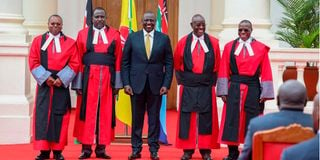Premium
Ode to a true reformer who isn’t invested in self-righteous rhetoric

President William Ruto with the newly sworn-in Court of Appeal Judges from left Justices Joel Ngugi, Weldon Korir, Aggrey Muchelule and George Odunga at State House, Nairobi on September 14, 2022.
What you need to know:
- Cementing his profile as a unique politician who goes out of his way to keep his word, Ruto pronounced several measures of immense consequence mere minutes after taking office.
- The point the President has taken great trouble to make is that constitutional compliance and institutional independence are not favours or a matter of personal preference and inclination.
- Rather, the integrity of an administration, and credibility of leadership, depends on demonstrable enthusiasm to obey the Constitution, the law and the decisions of the courts, and to do all he can in keeping his word.
William Ruto launched his presidency with a bang. Cementing his profile as a unique politician who goes out of his way to keep his word, he pronounced several measures of immense consequence mere minutes after taking office.
Beyond ‘kusema na kutenda’, he ensured that his Day One pledges were redeemed on Day One.
The Judiciary was finally relieved of the scandalous reek of executive failure.
Judges who had been recommended by the Judicial Service Commission for appointment many years ago remained in excruciating purgatory as they awaited formal appointment at the instance of the president.
This perturbing indeterminacy persisted even under the Handshake regime in which Raila Odinga, a self-proclaimed champion of democracy and the rule of law, was a principal.
Enter Ruto, and arrangements were promptly made to complete the constitutional judicial appointive processes, with the result that the judges were at State House for swearing-in on Day Two.
The President had also campaigned to activate the Judiciary Fund, which had lain in limbo for over a decade.
Kenyatta’s administration, under pressure from the campaign, did take steps while on its last legs, and the Fund was set in operation in July.
Diminution of the Judiciary
Ruto, aware of the opportunity costs of the delay, as well as the relative diminution of the Judiciary budget over time, further committed to funding the Judiciary by an additional Sh3 billion annually for the next five years.
Ruto’s unprecedented yet constitutionally overdue measures did not stop there.
To affirm the constitutionally mandated independence of the National Police Service, he executed the requisite instrument to authorise the appointment of the Inspector-General as the accounting officer, terminating the total policy, strategic and operational control of the service by the Office of the President.
It is imperative to note that among the judges appointed this week are some of the boldest judicial radicals who have, over time, become the bane of the Executive and absolute nemeses of the political establishment owing to what one might term their ‘reggae-stopping’ decisions.
On the same note, it is noteworthy to acknowledge that there is probably little love lost between the serving Inspector-General and the President, and, arguably, many in his administration.
The point the President has taken great trouble to make is that constitutional compliance and institutional independence are not favours or a matter of personal preference and inclination.
Rather, the integrity of an administration, and credibility of leadership, depends on demonstrable enthusiasm to obey the Constitution, the law and the decisions of the courts, and to do all he can in keeping his word.
Constitutional compliance
As it were, constitutional compliance is an excellent minimum for a decent presidency.
A politician whose word is his bond is a fantastic bonus; ask Amason Jefa Kingi, Moses ‘Weta the Fifth’ Wetang’ula, or Musalia ‘Earthquake’ Mudavadi’.
Not only is this great for the rule of law, the comfort it signals to citizens across the political divide is the foundation of national confidence that can propel rapid growth and enhance stability. This is the good spot we find ourselves in.
I came here chiefly to remark about this emergence of a true reformer who is not invested in the pie-in-the-sky rhetoric of Kenya’s self-righteous reformist orthodoxy.
It is a perfect moment to do this because Raila Odinga, the putative father of our democracy and champion of Kenya’s second liberation, finally broke his silence to utter heresies.
Odinga, whose authority on matters of reform, constitutionalism, rule of law and democracy is absolutely oracular, appears to have given up on his hard-earned profile.
Beyond discrediting the final pronouncement of the highest court in the land – against which no appeal is legally possible and is, therefore, the effective interpretation of the Constitution and the law – Odinga actually termed the decision of the Supreme Court ‘thuggery’, and called for mass action to chastise it.
Obviously disenchanted with the decision to dismiss his petition, Odinga has resorted to the street to ‘revisit’ the court, just as Kenyatta employed his executive power and the Building Bridges Initiative to revisit it after the 2017 election.
Street action
In the past, Odinga has successfully revisited the electoral agency, which was forced to shed commissioners, including its chairman, Issack Hassan.
Post-2007, Odinga refused to petition Kibaki’s re-election, and the street action spiralled into the tragic post-election crisis.
The revisiting then was undertaken by the Kriegler Commission, the new Constitution and the Judges and Magistrates Vetting Board.
It is not 2007, and it may fairly be said that Kenya has attained a level of institutional maturity that renders mass action as an avenue to prosecute electoral grievances considerably awkwardly.
Odinga is stuck firmly in a time warp. Fluent protestation of progressive platitudes are no match for unpretentious effective delivery and the businesslike achievement of substantial transformational progress.
Odinga, his political fellow travellers and civil society apostles will soon find, to their everlasting shock, that their lunch is all eaten by Ruto, the new reformer.
Mr Ng’eno is a lawyer and former State House speechwriter





